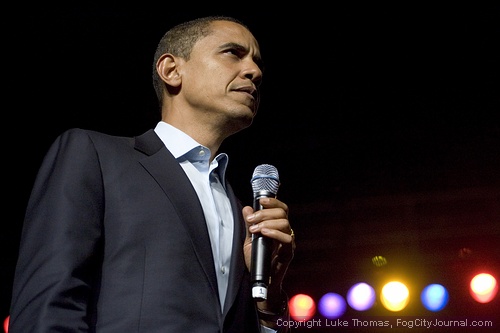
From Barack Obama Campaign Manager David Plouffe (excerpted)
April 23, 2008
Last night, Senator Clinton used up her last, best chance to cut appreciably into Barack Obama’s elected delegate lead.
She came up short.
In fact, she barely made a dent. At most, she picked up a net gain of 12 delegates — less than our gain, for example, in Colorado (where we gained 17) or Kansas (where we gained 14). Her gain in Pennsylvania was less than half of our gain in Virginia, where we added to our lead by 25 delegates.
Here’s how it breaks out:
After Pennsylvania, we have a lead of at least 159 elected delegates earned through all of the primaries and caucuses so far. We have a total of at least 1493 pledged delegates.
Meanwhile, we’ve been rapidly gaining ground among the so-called superdelegates (elected leaders and party officials who get a vote to choose our nominee), cutting Senator Clinton’s lead from more than 100 early this year to less than 25. We have a total of 238 publicly committed superdelegates.
The total number of delegates needed to secure the nomination is 2,024. That means we are only 293 delegates away from securing the nomination.
In less than two weeks, we’ll square off in the key battleground states of North Carolina and Indiana, when there will be more delegates at stake than there were last night in Pennsylvania.
Pennsylvania was considered a state tailor-made for Senator Clinton — she was always expected to win, and we trailed by as much as 25 points in the weeks leading up to the election.
Barack gained support among key voters in the face of long odds and unrelenting negativity from Senator Clinton, and kept the margin close enough that her delegate gain was insignificant.
Indeed, the only surprising result from Pennsylvania is how much Barack was able to improve his standing among key voter groups since the Ohio primary.
Among white voters, Obama narrowed the gap by 6 points. Among voters over 60, he nearly cut the gap in half, from 41 points to 24 points. Meanwhile, we continued to run strong where we have all along — for example, winning voters ages 18-24 with over 65% of the vote.
Barack campaigned hard in Pennsylvania. He talked about his plans to stand up to the special interests and bring people together so that we can change Washington to turn our economy around, make sure that every American has quality health care, and bring this misguided war to an end.


 The Hunger Site
The Hunger Site
No Comments
Comments for The Facts: Clinton comes up short are now closed.